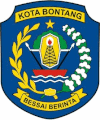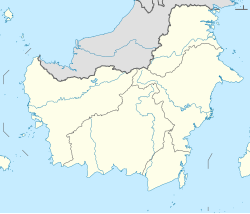Bontang
|
Bontang Kota Bontang |
||
|---|---|---|
| City | ||
|
||
 Location of the city in East Kalimantan province |
||
| Location of the city in East Kalimantan province | ||
| Coordinates: 0°08′N 117°30′E / 0.133°N 117.500°ECoordinates: 0°08′N 117°30′E / 0.133°N 117.500°E | ||
| Country | Indonesia | |
| Subdivision | East Borneo | |
| City Established | October 12, 1999 | |
| Government | ||
| • Mayor | Ir. H. Adi Darma. M.S | |
| Area | ||
| • Total | 497.57 km2 (192.11 sq mi) | |
| Population (2012) | ||
| • Total | 175,830 | |
| • Density | 350/km2 (920/sq mi) | |
| Time zone | WITA (UTC+8) | |
| Area code(s) | (+62) 548 | |
Bontang is a city on the eastern coast of the island of Borneo in Indonesia, in the province of East Kalimantan. It occupies an area of 497.57 km2, and the population was 140,787 at the 2010 Census. However, the 2012 Civil Registry listed the population of the city as 175,830.
Bontang City is divided into three districts (kecamatan), tabulated below with their 2010 Census population:
The etymology of Bontang refers to the town’s traditional status throughout history as a humble village populated mostly by immigrants. ‘Bon’ can refer in Indonesian to ‘receipt’ and ‘tang’ to ‘debt.’ Alternately, the name of the town means group of visitors. A coastal town, Bontang was initially a settlement governed under the Kutai Sultanate based in Tenggarong, a city in East Kalimantan.
In 1972 the government of the Kutai regency recognized Bontang as a district, and in 1984 its status changed to town.
The major development of Bontang took place after two major companies were founded there in the 1970s, PT Badak Liquid Natural Gas and PT Pupuk Kaltim. The former was established in 1974. PT Pupuk Kaltim, a company specializing in the production of ammonia and fertilizer, followed three years later.
Bontang is located between 117023 LE and 117032 LE and 0001 LN and 0012 LN. It occupies an area of 497.57 km2.
The town is hilly and located on an ocean estuary. It is relatively swampy, with frequent flooding, especially in its north district. There is little to no tectonic activity in Bontang. A mangrove forest (600 ha) is located in the town. Bontang gets its fresh water from the Api-Api River.
Bontang has a tropical rainforest climate. As such the temperature is warm and relatively stable throughout the year. Rainfalls are frequent and abundant. Two minor seasonal periods can be identified: one drier than the other. The so-called 'dry' season lasts approximately from May until September (but average lower precipitations remain above 80 mm per month). The 'rainy' season starts around November and ends around May.
In 2002, the population of Bontang was 105,000, and was growing at a rate of 4% per year. According to a survey done that year, there were slightly more males than females, with males accounting for 52.09% of the population. The same survey reported that the majority of people living in Bontang are young, with 42.6% of the population 19 and under, 47.3% between the ages of 20 and 44, and only 10.1% of the population over the age of 44. At the 2010 Census, the city population was enumerated at 140,787.
...
Wikipedia


